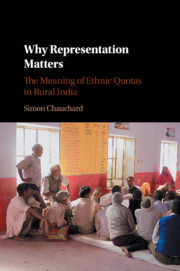Description
Why Representation Matters
The Meaning of Ethnic Quotas in Rural India
Author: Chauchard Simon
This book explores how political quotas mandating inclusion of marginalized groups socially impact the intergroup relations.
Language: English
Subject for Why Representation Matters:
Approximative price 36.76 €
In Print (Delivery period: 14 days).
Add to cart
Why Representation Matters
Publication date: 01-2019
Support: Print on demand
Publication date: 01-2019
Support: Print on demand
Approximative price 73.89 €
In Print (Delivery period: 14 days).
Add to cart
Why Representation Matters
Publication date: 02-2017
Support: Print on demand
Publication date: 02-2017
Support: Print on demand
Description
/li>Contents
/li>Biography
/li>
When members of groups that have long been marginalized finally gain access to political offices, it is expected that the social meaning of belonging to such a group will change and that these psychological changes will have far-reaching behavioral consequences. Supporters of political quotas granting such access often argue that they improve the nature of intergroup relations. However, these presumed psychological effects have remained surprisingly uncharted and untested. Do policies mandating the inclusion of excluded groups in political offices change the intergroup relations? If so, in what ways? By drawing on careful multi-method explorations of a single case - local-level electoral quotas for members of formerly 'untouchable' castes in India - this book provides nuanced, thorough and ultimately optimistic responses to these questions.
List of figures; List of tables; Acknowledgments; Note on terminology; 1. Political representation and intergroup relations; 2. Untouchability in rural India: persistence and evolution; 3. Local representation in rural India: a view from the ground; 4. Theory: the impact of descriptive representation; 5. Quantitative methodology; 6. The material and tangible effects of descriptive representation; 7. The cognitive impact of descriptive representation; 8. The effects of descriptive representation on interpersonal relations; 9. Descriptive representation and intergroup relations in comparative perspective; Appendix A. Methodical note on field research; Appendix B. The pair-matches; Appendix C. Additional balance tests; Appendix D. Did members of the scheduled castes self-select into reserved villages?; Bibliography; Index.
Simon Chauchard is an assistant professor in the Department of Government at Dartmouth College, New Hampshire, where he is a faculty affiliate in the Asia and Middle Eastern Studies program. Recent works have appeared in Political Opinion Quarterly, the American Political Science Review and Comparative Political Studies.
© 2024 LAVOISIER S.A.S.




